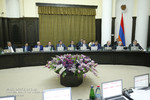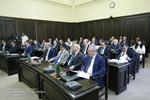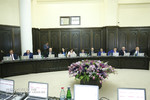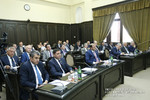Thursday, 18 August 2016
Cabinet Sitting Discusses Progress in Implementation of Anticorruption Council Meeting Assignments
A regular Cabinet meeting was held today, chaired by Prime Minister Hovik Abrahamyan.
Before proceeding to the agenda, Minister of Justice Arpine Hovhannisyan reported progress in implementation of Anticorruption Council meeting assignments.
“Specific work has been done to ensure compliance with the assignments given at Anticorruption Council meetings of June 15 and June 17. Moreover, the activities involved a number of public agencies, international organizations and representatives of civil society. In particular, the improvement of the institutional system for the implementation of the recommendation concerning the fight against corruption should be noted that the models used in the fight against corruption appear to be directly dependent on the distribution functions of those bodies supposed to fight against corruption.
International experience shows that these agencies should perform three main functions: training, prevention or investigation (law enforcement). The preventive function implies declaration of property, development, implementation and monitoring of anticorruption strategies through coordinating councils or targeted preventive bodies.
The training or educational function implies, as the ultimate goal, raising the public’s awareness of applicable laws and regulations, which is carried out through educational programs and methods, which should be introduced in pre-school institutions and schools through the establishment of appropriate vocational training bodies for public servants in universities. The investigative function is probably the simplest one, namely the investigation of corruption offenses.
It should be noted that in a number of countries all three functions are ensured by a single body, called a universal body, which is actually the multifunctional model. In this respect, interesting is Ukraine’s experience, which while has elements of the decentralized model, but an approach has been adopted to make a transition to the universal model. The universal model is being applied in Hong Kong, Singapore, Lithuania, Latvia and others.
The second model, which I would call a decentralized model, includes two models, with the preventive and educational functions carried out by a single body, while the investigative function is carried out by another authority. Here, it should be noted that in the case of both models is of utmost importance that should be the main function for the appropriate implementation of the investigative function of the body, not the body, among other things, to conduct the investigation of corruption offenses.
As a matter of fact, the decentralized system is adopted in the Republic of Armenia, where prevention and the implementation of educational and investigative functions is assigned to different State bodies, in particular the implementation of preventive and educational function is primarily reserved to the Ethics Committee of high-ranking officials, while the investigative function is exercised by a special investigation service.
However, this model has some shortcomings in the Republic of Armenia, which in our opinion consists in the lack of institutional and operational independence.
The legal basis for anticorruption bodies’ operations in many cases is of sub-legislative nature, the activities of some anti-corruption agencies such as the Anticorruption Council’s work is not of permanent nature, there are not sufficiently operational and institutional guarantees for the independence of the ethics committee of senior officials.
Given the current problems, we believe that there is a need for radical revision of the decentralized model or the introduction of the universal model. International experience has shown that these two models are equally valid, and no preference is given to either of them. Currently we are carrying out extensive work to study international experience, identify the characteristics of the aforementioned two models and develop institutional and legislative measures to be implemented in either case.
Having your instructions, Mr. Prime Minister, we will summarize our work shortly in order to submit to the Anticorruption Council equally efficient models.
The other recommendation raised by the Anticorruption Council related to the introduction of an institute for identifying the actual owners of property. Our research shows that the world is moving towards the introduction of the institute of real owners.
Thus, the European Union has made a significant step towards the identification of actual owners. On 20 May, 2015, the European Parliament and the Council of Europe adopted Directive 4, dated 2015/849 against money laundering in the European Union, according to which all EU-member countries are required to obtain and maintain proportionate, accurate and updated information about the companies registered on their territory.
The member states are obliged to ensure the existence of a central register of real owners. June 2017 is set as the deadline for fulfilling the aforementioned obligations. In addition, public registers of real owners have been established in the UK, Slovakia and Denmark. Efforts are underway in Norway to comply with this directive.
However, it should be noted that as of today, no all-comprehensive, finalized and successful model has been developed in the world that can be immediately introduced in our country. That is why we have decided to make small but important steps in this direction. We decided to start from one of our most important areas, namely public procurement. It refers to the following: Organizations that wish to participate in the public procurement process must disclose their real owners. In addition, disclosure should be made at the level of individuals, not only at the level of the companies’ respective shares.
By saying real owner, we mean those possessing directly or indirectly a 10 percent stake in a company, or the right to appoint or dismiss members of the legal entity’s executive body, or are entitled to 15% profit from a business or other activity carried on by a legal entity, which they receive in person or, in case of their absence, by the head of executive body and members of the legal entity.
Moreover, it is important that the legal person must not only declare who are its real owners, but also must submit legally binding documents that substantiate its statements. Indeed, responsibility should be applied in case of infringement.
The next recommendation focused on illegal enrichment. It refers to the fact that if public officers state a significant increase in assets and income without substantiating such increase, which may be disproportionate to their legitimate income, the competent authorities may ask them to justify the apparent inadequacy between the stated growth in income and legitimate income. Should public officers prove unable to explain the discrepancy, they must be called to responsibility.
Of course, it should be noted that this approach may have some problems with the principle of presumption of innocence, but we have considered the matter; we have held numerous discussions with experts.
Our position is that there is no problem with the principle of presumption of innocence: as a matter of fact, public officers are required to substantiate any disproportion between their legitimate income and the stated growth in revenues or capital expenditures. However, we do believe that the package itself is not enough to resolve all the problems of illegal enrichment: other regulations may be needed to address the problem. This is the focus of our next package.
In the case of illegal enrichment, persons may enter into fraudulent loan transactions, and thus legalize their illegal income or property. In this regard, we believe that effective guarantees will be provided by the legislative package related to. In particular, loan-related cash transactions above a specific amount should be prohibited: they must be conducted solely through bank transfers. In addition, either real estate transactions above a certain amount should be made exclusively through bank transfers.
I think that this and a number of other steps will help us combat corruption more effectively. For instance, we are currently studying international experience related the statements of foreign accounts,” the Minister said.
The Government approved a bill on amendments to the Law on Customs Regulation and the Law, which has been drafted with a view to simplifying import and export procedures in small and medium business. It is expected to simplify the process of transferring low-value goods through the customs border, in the case of entities exempt from payment of customs duty.
In particular, the amendment provides that such goods with a total customs value of not more than euro 200 as may be imported and/or exported from one carrier to one recipient through one transport document should be exempt of customs duties and fees.
The Government approved the proposal on signing an agreement on air communication between the Government of the Republic of Armenia and the Government of the Kingdom of Belgium. The new agreement seeks to facilitate the introduction of the Government’s Open Skies policy and ensure a level playing field for both countries’ air carriers.
Money will be allocated to the Ministry of Justice to comply with the ruling of the European Court of Human Rights of April 7, 2016 regarding the “Simonyan vs. Armenia” case.
In this connection, Prime Minister Hovik Abrahamyan instructed the Government Staff, as well as the Finance and Justice ministries to make an inventory of those amounts disbursed in 2014 and 2015 under the rulings of the European Court of Human Rights. “Should there be someone held responsible for wrong decisions or not?” the Prime Minister noted.













